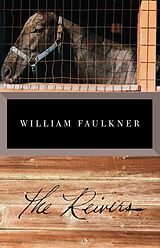The Reivers
Einband:
Kartonierter Einband
EAN:
9780679741923
Untertitel:
Englisch
Genre:
Romane & Erzählungen
Autor:
William Faulkner
Herausgeber:
VINTAGE
Auflage:
Vintage Intl
Anzahl Seiten:
320
Erscheinungsdatum:
01.09.1992
ISBN:
978-0-679-74192-3
Informationen zum Autor William Faulkner , one of the greatest writers of the twentieth century, was born in New Albany, Mississippi, on September 25, 1897. He published his first book, The Marble Faun , in 1924, but it is as a literary chronicler of life in the Deep Southparticularly in the fictional Yoknapatawpha County, the setting for several of his novelsthat he is most highly regarded. In such novels as The Sound and the Fury , As I Lay Dying , Light in August , and Absalom, Absalom! he explored the full range of postCivil War Southern life, focusing both on the personal histories of his characters and on the moral uncertainties of an increasingly dissolute society. In combining the use of symbolism with a stream-of-consciousness technique, he created a new approach to fiction writing. In 1949 he was awarded the Nobel Prize for Literature. William Faulkner died in Byhalia, Mississippi, on July 6, 1962. Klappentext One of Faulkner's comic masterpieces, The Reivers is a picaresque that tells of three unlikely car thieves from rural Mississippi. Eleven-year-old Lucius Priest is persuaded by Boon Hogganbeck, one of his family's retainers, to steal his grandfather's car and make a trip to Memphis. The Priests' black coachman, Ned McCaslin, stows away, and the three of them are off on a heroic odyssey, for which they are all ill-equipped, that ends at Miss Reba's bordello in Memphis. From there a series of wild misadventures ensues-involving horse smuggling, trainmen, sheriffs' deputies, and jail.One Grandfather said: This is the kind of a man Boon Hogganbeck was. Hung on the wall, it could have been his epitaph, like a Bertillon chart or a police poster; any cop in north Mississippi would have arrested him out of any crowd after merely reading the date. It was Saturday morning, about ten oclock. We-your great-grandfather and I-were in the office, Father sitting at the desk totting up the money from the canvas sack and matching it against the list of freight bills which I had just collected around the Square; and I sitting in the chair against the wall waiting for noon when I would be paid my Saturday's (week's) wage of ten cents and we would go home and eat dinner and I would be free at last to overtake (it was May) the baseball game which had been running since breakfast without me: the idea (not mine: your great-grandfather's) being that even at eleven a man should already have behind him one year of paying for, assuming responsibility for, the space he occupied, the room he took up, in the world's (Jefferson, Mississippi's anyway) economy. I would leave home with Father immediately after breakfast each Saturday morning, when all the other boys on the street were merely arming themselves with balls and bats and gloves-not to mention my three brothers, who being younger and therefore smaller than I, were more fortunate, assuming this was Father's logic or premise: that since any adult man worth his salt could balance or stand off four children in economic occupancy, any one of the children, the largest certainly, would suffice to carry the burden of the requisite economic motions: in this case, making the rounds each Saturday morning with the bills for the boxes and cases of freight which our Negro drivers had picked up at the depot during the week and delivered to the back doors of the grocery and hardware and farmers' supply stores, and bring the canvas sack back to the livery stable for Father to count and balance it, then sit in the office for the rest of the morning ostensibly to answer the telephone-this for the sum of ten cents a week, which it was assumed I would live inside of. That's what we were doing when Boon came jumping through the door. That's right. Jumping. It was not really a high step up from the hallway, even for a boy of eleven (though John Powell, the head hostler, had had Son Thomas, the youngest driver, find, bo...
Autorentext
William Faulkner, one of the greatest writers of the twentieth century, was born in New Albany, Mississippi, on September 25, 1897. He published his first book, The Marble Faun, in 1924, but it is as a literary chronicler of life in the Deep South—particularly in the fictional Yoknapatawpha County, the setting for several of his novels—that he is most highly regarded. In such novels as The Sound and the Fury, As I Lay Dying, Light in August, and Absalom, Absalom! he explored the full range of post–Civil War Southern life, focusing both on the personal histories of his characters and on the moral uncertainties of an increasingly dissolute society. In combining the use of symbolism with a stream-of-consciousness technique, he created a new approach to fiction writing. In 1949 he was awarded the Nobel Prize for Literature. William Faulkner died in Byhalia, Mississippi, on July 6, 1962.
Klappentext
One of Faulkner's comic masterpieces, The Reivers is a picaresque that tells of three unlikely car thieves from rural Mississippi. Eleven-year-old Lucius Priest is persuaded by Boon Hogganbeck, one of his family's retainers, to steal his grandfather's car and make a trip to Memphis. The Priests' black coachman, Ned McCaslin, stows away, and the three of them are off on a heroic odyssey, for which they are all ill-equipped, that ends at Miss Reba's bordello in Memphis. From there a series of wild misadventures ensues-involving horse smuggling, trainmen, sheriffs' deputies, and jail.
Zusammenfassung
One of Faulkner’s comic masterpieces, The Reivers is a picaresque that tells of three unlikely car thieves from rural Mississippi. Eleven-year-old Lucius Priest is persuaded by Boon Hogganbeck, one of his family’s retainers, to steal his grandfather’s car and make a trip to Memphis. The Priests’ black coachman, Ned McCaslin, stows away, and the three of them are off on a heroic odyssey, for which they are all ill-equipped, that ends at Miss Reba’s bordello in Memphis. From there a series of wild misadventures ensues—involving horse smuggling, trainmen, sheriffs’ deputies, and jail.
Leseprobe
One
Grandfather said:
This is the kind of a man Boon Hogganbeck was. Hung on the wall, it could have been his epitaph, like a Bertillon chart or a police poster; any cop in north Mississippi would have arrested him out of any crowd after merely reading the date.
It was Saturday morning, about ten oclock. We-your great-grandfather and I-were in the office, Father sitting at the desk totting up the money from the canvas sack and matching it against the list of freight bills which I had just collected around the Square; and I sitting in the chair against the wall waiting for noon when I would be paid my Saturday's (week's) wage of ten cents and we would go home and eat dinner and I would be free at last to overtake (it was May) the baseball game which had been running since breakfast without me: the idea (not mine: your great-grandfather's) being that even at eleven a man should already have behind him one year of paying for, assuming responsibility for, the space he occupied, the room he took up, in the world's (Jefferson, Mississippi's anyway) economy. I would leave home with Father immediately after breakfast each Saturday morning, when all the other boys on the street were merely arming themselves with balls and bats and gloves-not to mention my three brothers, who being younger and therefore smaller than I, were more fortunate, assuming this was Father's logic or premise: that since any adult man worth his salt could balance or stand off four children in economic occupancy, any one of the children, the largest certainly, would suffice to carry the burden of the requisite economic motions: in this case, making the rounds each Saturday morning with the bills for the boxes and cases of …

Leider konnten wir für diesen Artikel keine Preise ermitteln ...
billigbuch.ch sucht jetzt für Sie die besten Angebote ...
Die aktuellen Verkaufspreise von 6 Onlineshops werden in Realtime abgefragt.
Sie können das gewünschte Produkt anschliessend direkt beim Anbieter Ihrer Wahl bestellen.
Loading...
Die aktuellen Verkaufspreise von 6 Onlineshops werden in Realtime abgefragt.
Sie können das gewünschte Produkt anschliessend direkt beim Anbieter Ihrer Wahl bestellen.
| # | Onlineshop | Preis CHF | Versand CHF | Total CHF | ||
|---|---|---|---|---|---|---|
| 1 | Seller | 0.00 | 0.00 | 0.00 |
